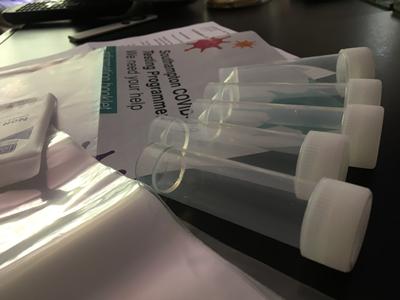
Widespread testing for COVID-19 using a simple, home-based saliva test is to be trialled within educational settings in Southampton.
This is the second phase of a ground-breaking programme to evaluate large scale population testing, led by a partnership of the University of Southampton, Southampton City Council and the NHS.
Earlier this year, the partnership trialled the testing method on large number of households in the city on a weekly basis. Nearly 10,000 people took part in this successful first phase which showed that an at-home saliva sampling kit can provide a reliable method for large-scale, regular testing and established systems to return results within 48 hours. It also provided further evidence for the accuracy of a rapid, lower cost ‘RT-LAMP’ laboratory test in detecting coronavirus.
The second phase will evaluate the application of the convenient, non-invasive saliva test in educational settings, involving staff and students at the University of Southampton and staff and pupils from four local schools where this kind of testing offers the potential to avoid wholesale or long-term closures.
Saliva samples will be collected on a regular basis from participants and taken to the Animal and Plant Health Agency in Weybridge where they will be tested using Optigene’s COVID-19 LAMP test. Results will be returned no more than 48 hours later.
Over 20,000 students, pupils and staff from University of Southampton and the four schools will be invited to participate in the programme.
“By providing such testing in schools we aim to give pupils, parents and staff confidence in the management of infection risk in schools.” Explained Keith Godfrey of the University of Southampton’s MRC Lifecourse Epidemiology Unit.
The details of those who test positive will be shared with the NHS Test and Trace programme so contact tracing can start immediately.
Through testing University of Southampton students, who will be arriving from across the UK and overseas, the partnership aims to keep the infection risk low in Southampton and give confidence to those students, staff and local communities.
Councillor Christopher Hammond, Leader of Southampton City Council, said: “Regular testing is a vital tool to help us manage the risk of Covid-19 infection in our communities. Thanks to the thousands of Southampton residents who took part in the first phase of this trial, we now have a much greater understanding of the potential for this promising new saliva test. The second phase will help us to better understand how the test can be rolled out across different types of school and university settings as they reopen this Autumn. If we are successful, we hope to offer the testing programme to more settings in the near future.
Harry Kutty, Headteacher at Cantell Secondary School and Chair of the Aspire Community Trust who represents the four schools involved in this phase of the trial, commented: “We’re really excited to be part of this innovative trial. Getting schools open and running safely and smoothly is our number one priority and anything that could potentially help give parents, teachers and staff confidence and avoid wholesale closures has to be a good thing. Hopefully what we learn as early adopters can help to develop this programme to be available to more schools and other settings in future.”
Professor Godfrey added: “Those taking part will help pave the way for wider regular testing across educational, community and business settings here in Southampton and more widely. What we learn from the Southampton COVID-19 Testing Programme will inform national policy and coronavirus control measures elsewhere across the country.”
University students will be encouraged to take a test on their arrival in Southampton, then periodically during the autumn term alongside testing of some staff, prompted by text message.
Testing for the schools will be on a weekly basis involving four schools in the Aspire Community Trust (Mount Pleasant Junior, Maytree Infant, Swaythling Primary, and Cantell Secondary).





